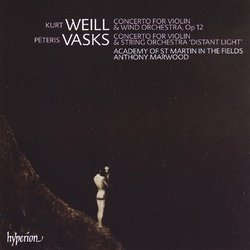| All Artists: Kurt Weill, Peteris Vasks, Anthony Marwood, Academy of St. Martin-in-the-Fields Title: Weill: Concerto for Violin & Wind Orchestra; Vasks: Concerto for Violin & String Orchestra 'Distant Light' Members Wishing: 0 Total Copies: 0 Label: Hyperion UK Original Release Date: 1/1/2005 Re-Release Date: 11/15/2005 Album Type: Import Genre: Classical Styles: Chamber Music, Forms & Genres, Concertos, Historical Periods, Classical (c.1770-1830), Instruments, Strings Number of Discs: 1 SwapaCD Credits: 1 UPC: 034571174969 |
Search - Kurt Weill, Peteris Vasks, Anthony Marwood :: Weill: Concerto for Violin & Wind Orchestra; Vasks: Concerto for Violin & String Orchestra 'Distant Light'
 | Kurt Weill, Peteris Vasks, Anthony Marwood Weill: Concerto for Violin & Wind Orchestra; Vasks: Concerto for Violin & String Orchestra 'Distant Light' Genre: Classical |
Larger Image |
CD Details |
CD ReviewsThe question and the answer Daniel R. Greenfield | Milwaukee, Wisconsin, United States | 09/13/2006 (5 out of 5 stars) "Kurt Weill composed his violin concerto in 1924 when he was just 24, shortly before he transitioned away from the strictly classical. It shows the influence of Stravinsky and Schoenberg. There is also a noticeable jazz influence. It has been described as "wonderfully sleazy". The violin concerto by Latvian-born Peteris Vasks (born 1946) could not be further removed from Weill's work. This work has been described as "fragile, beautiful, otherworldly", and (in Vasks' own words) "nostalgia with a touch of tragedy." So what do these two excellent concertos have in common? For starters, I would say that they both have Anthony Marwood's inspired, devoted and flawless interpretation that infuses both with a sense of deep mystery, suggested in part by the darkly enigmatic art of Joseph Uhl which graces the cover. In addition, both works put forth a considered stance toward the existential darkness which seems to engulf modern life. The Weill concerto seems to be saying, cope with the meaningless, embrace it, and try to find some dark humor in it. By contrast, the Vasks concerto urges a resolute inner strength that will eventually overwhelm the darkness so that the distant light, "the glittering stars millions of light years away" (Vasks) light our path and guide us forward in our quest for ultimate meaning. These two works could not be more unalike in temperament, nor their styles more different. The Vasks concerto is elegiac, emotional, mournful, spiritual, tonal, and seering, whereas the Weill concerto is ironic, relatively atonal, cerebral, matter-of-fact, witty, urbane, and perfunctory. Both are masterworks which produce different responses in the listener. Vasks' work grabs you by the throat, mesmerizes you, until the last ounce of resistance is wrung out of you. You grab hold and ride its emotional wave. Weill's work is dry, self-deprecating, sophisticated, and inventive. It is the product of a young man, filled with confidence, even a little cocky perhaps. The Vasks concerto resides in a state of acute emotional crisis. It is torn between Yes and No. The great battle for Yes is fought in the fourth movement, but it is a short-lived battle. Immediately the fifth movement brings, if not resolution, then faith, earnestness, sincerety. The elegaic tone resumes, mournful, probing, touched with tragedy, reminiscence, wistfulness. There is a sense in which the Weill concerto is a preface to the Vasks, or rather; the Weill concerto is the question - to which the Vasks concerto is the answer. Vasks' concerto gives the meditations of a composer far more mature than the twenty-four year old Weill. But Weill has asked the right question. And that is perhaps just as important." Richly rewarding little knowns David Thierry | Chicago, IL United States | 11/16/2008 (5 out of 5 stars) "These are two rather different works but complementary, the Weill more dynamic, energetic, virtuosic, a little spikey for tender ears, nicely orchestrated, punchy. The Vasks begins more lyrically, melancholy, gradually becoming more energized. The Weill is not unlike Hindemith's Kammermusic if you know those works. I'm tempted to compare it to Szymanovksi's concertos, but they occupy a more lush and exotic sound world. This is the first orchestral work by Vasks that I've found really engaging and interesting. Previous recordings of his music I felt were bland and predictably safe and conservative. For those who insist both these pieces are nothing but noise I will remind you that critics said the same of Brahms' Violin Concerto when it debuted. In fact everything Brahms wrote was awful noise and trash until he reached his 60s and acquaired the mantle of Old Master. Tchaicovsky's 7th and 9th chords were considered very daring in his day. Parishioners complained about all the dissonance in Bach's Chorales. Half of an audience left during intermission before Stravinsky came out to conduct The Firebird, assuming it would just be horrible. Brahms friend Joachim was playing Beethoven's Violin Concerto 50 years after it's premiere to tepid, polite applause. It still hadn't caught on yet. Charles Ives once said "Use your ears like a man!"" Anthony Marwood could play the phone book... Merwin N. Siu | 05/12/2007 (5 out of 5 stars) "and it would be a recording worth having. The two pieces seem appropriate for two separate CDs - and it's a somewhat jarring experience to go from one to the other. However, his musicianship - especially his passionate declamations within the Vasks piece - rises above all of the many challenges put forward. The Vasks is a piece I normally associate with Gidon Kremer - Marwood's performance is more lyrical, his tone is more sumptuous, and his fervor is just as evident. Great orchestral support - the small size of the ensemble allows the players to play out without having to artificially limit their sound production."
|
